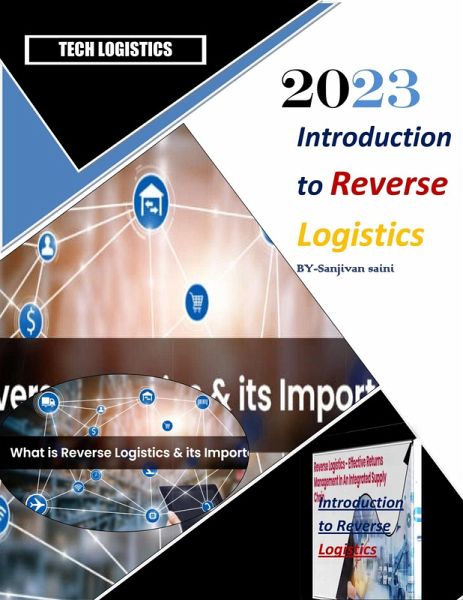
Introduction to Reverse Logistics (eBook, ePUB)

PAYBACK Punkte
0 °P sammeln!
The book titled "Introduction to Reverse Logistics,"authored by Sanjivan Saini, delves into the dynamic andincreasingly pivotal realm of reverse logistics. In today'sinterconnected and environmentally-conscious world,the process of managing goods and materials flowingbackward in the supply chain has gained paramountsignificance. This comprehensive guide offers readers anuanced understanding of the principles, practices, andcomplexities that underpin reverse logistics.The book commences with a lucid exploration of thefundamental concepts of reverse logistics, elucidatingits significance and its...
The book titled "Introduction to Reverse Logistics,"authored by Sanjivan Saini, delves into the dynamic andincreasingly pivotal realm of reverse logistics. In today'sinterconnected and environmentally-conscious world,the process of managing goods and materials flowingbackward in the supply chain has gained paramountsignificance. This comprehensive guide offers readers anuanced understanding of the principles, practices, andcomplexities that underpin reverse logistics.
The book commences with a lucid exploration of thefundamental concepts of reverse logistics, elucidatingits significance and its pivotal role in sustainabilityefforts. Delving into the need and principles of reverselogistics, it delves into the intricate web of factorsdriving the resurgence of returned goods,remanufacturing, recycling, and more.
Through systematic chapters, the author adeptlynavigates readers through the intricate landscape ofreverse logistics, dissecting its multifaceted aspects.These encompass the diverse circumstancesnecessitating reverse logistics, the myriad modesthrough which it is executed, and the economic andecological implications it holds.
The author leverages real-world examples and casestudies to enrich the reader's understanding,illustrating the practical applications of reverse logisticsin diverse industries. Discussions on optimizing freightexpenses, managing returns for recycling, and theintegration of reverse logistics within the broaderlogistics system provide a well-rounded perspective.
As the final chapters unfold, the book explores thechallenges and opportunities that reverse logisticspresents to businesses, coupled with an in-depthanalysis of its impact on the economy. The interplaybetween technology, regulatory frameworks, andsustainability goals in the context ofreverse logistics isthoughtfully examined, underscoring its role in shapingthe future of supply chain management.
Sanjivan Saini's "Introduction to Reverse Logistics"offers a valuable resource for students, practitioners,and academicians seeking a comprehensive overview ofthis evolving field. With its insightful narratives andpractical insights, the book serves as a compass, guidingreadersthrough the labyrinth of reverse logistics whilenurturing a keen awareness of its potential to transformmodern supply chains.
The book commences with a lucid exploration of thefundamental concepts of reverse logistics, elucidatingits significance and its pivotal role in sustainabilityefforts. Delving into the need and principles of reverselogistics, it delves into the intricate web of factorsdriving the resurgence of returned goods,remanufacturing, recycling, and more.
Through systematic chapters, the author adeptlynavigates readers through the intricate landscape ofreverse logistics, dissecting its multifaceted aspects.These encompass the diverse circumstancesnecessitating reverse logistics, the myriad modesthrough which it is executed, and the economic andecological implications it holds.
The author leverages real-world examples and casestudies to enrich the reader's understanding,illustrating the practical applications of reverse logisticsin diverse industries. Discussions on optimizing freightexpenses, managing returns for recycling, and theintegration of reverse logistics within the broaderlogistics system provide a well-rounded perspective.
As the final chapters unfold, the book explores thechallenges and opportunities that reverse logisticspresents to businesses, coupled with an in-depthanalysis of its impact on the economy. The interplaybetween technology, regulatory frameworks, andsustainability goals in the context ofreverse logistics isthoughtfully examined, underscoring its role in shapingthe future of supply chain management.
Sanjivan Saini's "Introduction to Reverse Logistics"offers a valuable resource for students, practitioners,and academicians seeking a comprehensive overview ofthis evolving field. With its insightful narratives andpractical insights, the book serves as a compass, guidingreadersthrough the labyrinth of reverse logistics whilenurturing a keen awareness of its potential to transformmodern supply chains.
Dieser Download kann aus rechtlichen Gründen nur mit Rechnungsadresse in A, B, CY, CZ, D, DK, EW, E, FIN, F, GR, H, IRL, I, LT, L, LR, M, NL, PL, P, R, S, SLO, SK ausgeliefert werden.













